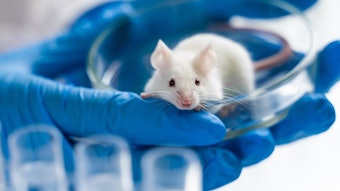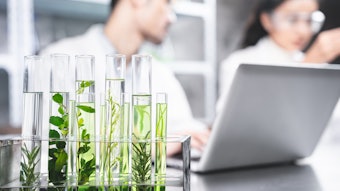A new biochip technology could vastly reduce animal testing in the cosmetics and other chemical industries, as well as reduce its use in the development of new pharmaceuticals, according to an announcement from Rensselaer Polytechnic Institute (RPI). Researchers at RPI, the University of California at Berkeley, and Solidus Biosciences Inc. have designed two biochips, the DataChip and the MetaChip, that are combined to reveal the potential toxicity of chemicals and drug candidates and whether those compounds will become toxic when metabolized in the body--all in one experiment without the use of animals.
Traditional toxicity testing has used animals to predict whether a chemical or drug candidate is toxic. However, according to RPI, with the large number of compounds being generated in the pharmaceutical industry and new legislation stipulating that chemicals undergo toxicity analysis, there is a rapidly emerging need for high-throughput toxicity testing.
“We looked at the issues facing companies and realized that we needed to develop something that was low-cost, high-throughput, easily automatable and that did not involve animals,” said co-lead author Jonathan S. Dordick, a former professor of chemical and biological engineering at Rensselaer and co-founder of Solidus Biosciences Inc., the company commercializing the chips, in a press statement. “We developed the MetaChip and DataChip to deal with the two most important issues that need to be assessed when examining the toxicity of a compound--the effect on different cells in [the] body and how toxicity is altered when the compound is metabolized.”
When the biochips are used together the result is a promising and affordable alternative to animal-based toxicology screening and a direct route to developing safe, effective drugs, according to reports. Currently, detailed toxicity screening does not come into the drug discovery process until later in the development, when significant time and money have already been invested in a compound.
Additionally, results on animals often are not equivalent to results on humans. Thus, the research team views the combined chips as an efficient, more accurate way to test drug compounds for human toxicity earlier in the discovery process.
Co-lead author and Solidus Biosciences co-founder Douglas S. Clark, professor of chemical engineering at the University of California at Berkeley, adds that pharmaceutical companies are not the only potential user. “The initial market will not necessarily be pharmaceuticals,” Clark said in the press announcement.
He explained that the initial market will likely be chemical and cosmetic companies that are being pushed to eliminate animal testing or that cannot afford such testing. By 2009, cosmetics companies selling in Europe will be restricted from using animal testing for chemical toxicity. “Obviously cosmetics need to be safe and ensuring the safety of new compounds without testing them on animals presents a new challenge to the industry, especially as the number of compounds increases," said Clark, in the press announcement. "These chips can meet this challenge by providing comprehensive toxicity data very quickly and cheaply.”
Dordick and Clark were joined in the research by Moo-Yeal Lee and Michael G. Hogg of Solidus Biosciences; R. Anand Kumar of Berkeley; and Sumitra M. Sukumaran of Rensselaer. The research was funded by the National Institutes of Health (NIH) and the New York State Foundation for Science, Technology and Innovation (NYSTAR).
For more information, visit the Rensselaer Polytechnic Institute Web site.





!['We believe [Byome Derma] will redefine how products are tested, recommended and marketed, moving the industry away from intuition or influence, toward evidence-based personalization.' Pictured: Byome Labs Team](https://img.cosmeticsandtoiletries.com/mindful/allured/workspaces/default/uploads/2025/08/byome-labs-group-photo.AKivj2669s.jpg?auto=format%2Ccompress&crop=focalpoint&fit=crop&fp-x=0.49&fp-y=0.5&fp-z=1&h=191&q=70&w=340)




